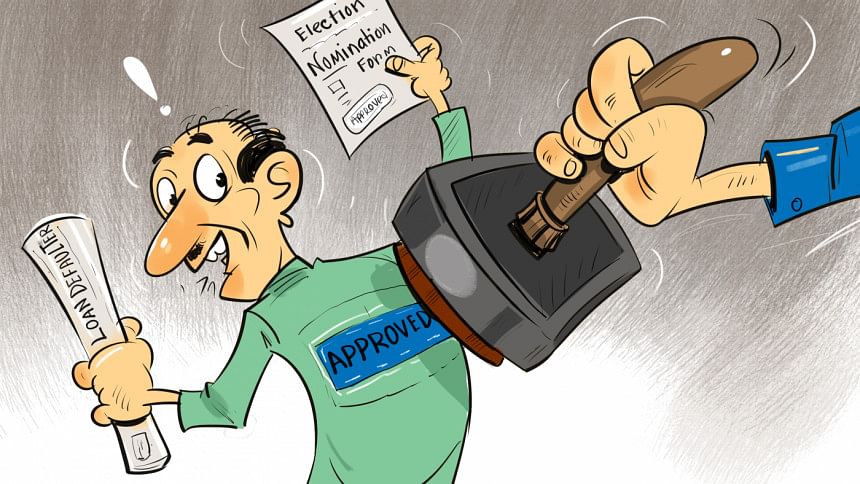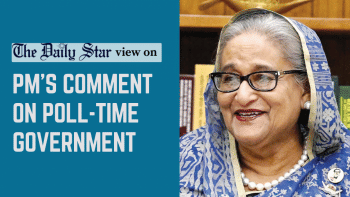Setting rules of the game without parties’ consent may prove unwise

When loan defaulting has become the most preferred option to get rich quicker for habitual defaulters, it seems they are so blessed that they can now contest the upcoming parliamentary election by rescheduling their loans or bills just a day prior to collecting nomination papers. The cabinet last week gave the final nod to the draft Representation of the People (amendment) Act (RPA) 2023 that will allow candidates to reschedule loans or bills on the day before collecting nomination papers, instead of the current rule of rescheduling them seven days prior to nomination paper collection.
There's little doubt about the magnitude and seriousness of the crisis that the accumulation of defaulted loans have caused in the country's banking sector. According to Prothom Alo (based on Bangladesh Bank data), while in 1990 the amount of defaulted loans was Tk 46.46 billion, in 2022 the amount reached Tk 1.3 trillion. The most loans have been defaulted in the past 14 years, when the dominance of businesspeople in parliament and in the government rose significantly. The International Monetary Fund (IMF), as part of its suggested reform plan, has set a deadline of September 2023 to implement changes in the Bank Company Act in order to be eligible for the next tranche of loan.
The government has also finalised the proposed draft amendment of the act which is now expected to be placed before parliament soon. The draft Bank Company (Amendment) Act, approved by the cabinet on March 28, 2023, (if and when it becomes law) will bar wilful defaulters from travelling abroad, registering houses, vehicles and companies, as well as from being in committees of political parties.
It is, therefore, quite intriguing how the RPA amendment can be so accommodating to defaulters who are desperate to gain political power.
Doing business is not a reason for automatic disqualification from taking part in politics or in elections. But if politics becomes a tool for taking unfair advantages of power and masking business failures, there's every reason to put in place preventative actions to desist such unethical practices. Questions about this group's ability to serve the nation becomes more important given that they are incapable of running their business projects efficiently and are defaulting in repaying debts and bills.
A good reminder about some of these businesspeople-turned-politicians has perhaps come from an unexpected source. The State Minister for Industries, Kamal Ahmed Majumder, said, "I have been in politics for 50 years. Forty years ago, those who I used to see walking around the streets with briefcases, without money, are now the owner-managers of banks." Speaking at a seminar on the SME sector in Dhaka on May 11, he said that these people have become directors of private banks by taking money from government banks. The minister stressed that the names of those who own such banks by looting money should be made public. But instead of doing that, Majumder says, we are giving them various facilities.
Doing business is not a reason for automatic disqualification from taking part in politics or in elections. But if politics becomes a tool for taking unfair advantages of power and masking business failures, there's every reason to put in place preventative actions to desist such unethical practices.
Is there any reason to not doubt his statement, as neither he nor any other part of the government has refuted the claim as a misquotation or as untrue?
Relaxing rules for defaulters, however, is not the only problem with the RPA amendment. If the draft amendment – as cleared by the cabinet – gets parliament's approval, the Election Commission (EC) will no longer be able to cancel an election in an entire constituency (as it had done in Gaibandha in October 2020). Instead, it will be allowed to postpone or cancel elections at one or more polling centres if it finds irregularities.
Election Commissioner Rashida Sultana tried her best to assure us that the amendment would still allow the EC to cancel or postpone elections, but had to concede that what the Commission sought was the authority to annul the result after it is announced by the returning officer. Empowering the EC to cancel voting for an entire constituency, even after results are announced, would have further ensured a fair election, EC Rashida Sultana added.
Despite any reservations that one may have against the current EC, it is true that the need for such empowerment has arisen and is greatly felt due to the politicisation of the civil administration. Partisan roles of returning officers – especially deputy commissioners and equivalent officials – in a number of elections since the abolition of the caretaker government system has eroded trust in the existing system of vote counting, tallying, and certifications.
The Representation of People Act is the most important part of an election as the rules set by this act require an agreement between all major contending parties. We all remember how a consensus reached by the three alliances after the fall of military dictator General Ershad had helped draw up the rules for the 1991 election. Since then, the RPA (or its previous model, known as the RPO) has been updated quite a few times, as per consensus between all major parties until the abolition of the caretaker government system. At present, unless such an agreement is reached between the major players in the political powers game – which is clearly absent as reflected in the reactions of the opposition – these amendments, whether empowering the EC more or curtailing it, would make very little difference in terms of ensuring a credible and fair election.
Kamal Ahmed is an independent journalist. His Twitter handle is @ahmedka1

 For all latest news, follow The Daily Star's Google News channel.
For all latest news, follow The Daily Star's Google News channel. 










Comments